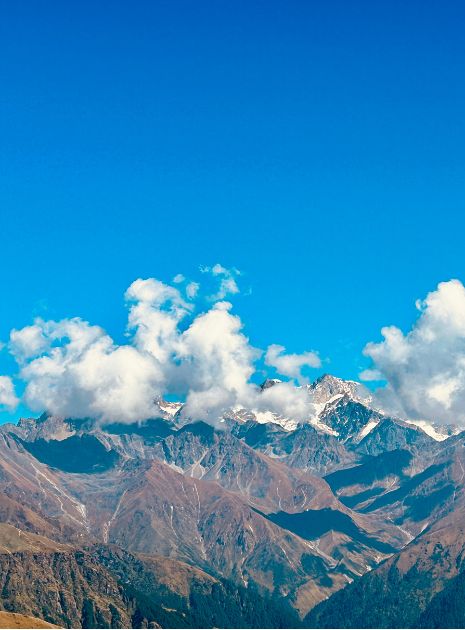Bangapani
If you stand at the edge of Bangapani (बंगापानी), you don’t hear noise. You hear a mix of small things: the call of a bird, a woman calling her child by name, a cow shaking its bell. The village doesn’t make a grand entry. It arrives slowly, like a song sung under the breath.
If you stand at the edge of Bangapani (बंगापानी), you don’t hear noise. You hear a mix of small things: the call of a bird, a woman calling her child by name, a cow shaking its bell. The village doesn’t make a grand entry. It arrives slowly, like a song sung under the breath.
सुबह (morning) here feels different. Smoke rises gently from a चूल्हा (dust stove), curling into the cool air. The smell of mandua (मंडुवा) porridge mixes with that of wet mitti. Old men sit down on charpais, their palms cupped around glasses of robust, candy chai. Children run barefoot across courtyards, a few carrying पीतल के लोटे (brass pots) for पानी, others guffawing for no motive at all.
No one rushes. The sun climbs slowly, the fields wake up, and so do the people.
The census says around 815 लोग live here, with 160 घर (families). Of these, women are just a little fewer than men, and children below six make up about seventy-five percent. On paper, it’s only numbers. But if you look closely, each number has a face. A child who trips on a stone path, a woman who weaves wool in the afternoon, a young boy dreaming of joining the सेना (army).
What stands out is education. The literacy rate is high, above 90%. You can see it in the way mothers read with their daughters at dusk, or how young boys scribble tables on slates while keeping an eye on goats.
Most houses are simple, made of stone and wood. नीचे (downstairs), goats and cows are tied. ऊपर (upstairs), the kitchen glows with fire. In courtyards, लाल मिर्च (red chilies) dry on mats, मकई (corn) hangs in bunches, and children’s drawings scratch the mud walls.
Hospitality is not a formality here. Walk into any home, and someone will say, “बैठो, चाय पियो.” You’ll be handed a steel glass, maybe a पकौड़ा or a piece of गुड़. That’s how belonging works in these hills, quiet, effortless.
Bangapani’s सीढ़ीदार खेत (terraced fields) stretch along the slopes. Mandua, आलू (potatoes), and rajma grow here. Work starts early, with girls carrying टोकरी (baskets) on their heads, guys guiding हल (ploughs) pulled by oxen, and children trailing in the back.
During बोआई (sowing), voices rise in folk songs. At harvest, families gather together, cutting, bundling, and stacking. These fields are not just farms. They are memories, every furrow dug by ancestors, every grain saved for tomorrow.
There’s no massive मंदिर (temple) towering here. Faith is softer. A पीपल का पेड़ wrapped in लाल धागा (red thread), a stone under which a diya glows at dusk, a whispered prayer before sowing seeds.
Festivals bring the village together. हरेला means barley sprouts placed at doorsteps, a symbol of green hope. Weddings are marked not by loud speakers, but by ढोल-दमाऊं (drums) and लोकगीत (folk songs). The sound carries across hills, children dance wildly, and women sing till their throats grow hoarse.
Once in a while, Bangapani feels louder. On बाज़ार (market) day, the slope fills with stalls masalas, caps, salt, and candies. The scent of गरम जलेबी and पकौड़े fills the air. Men buy over grain, ladies compare the expenses of oil, and youngsters tug at their mothers for a toy or a sweet.
Conversations stretch longer than purchases. One cup of tea may last an hour, with neighbors catching up on rain, crops, and weddings. It feels less like shopping, more like gathering.
The school here is small, its walls painted in fading blue. Inside, you hear the chorus of poems, tables, and laughter. Children arrive with slates tucked under their arms, sometimes barefoot, sometimes with worn-out chappals.
But after school, they are not done. They carry घास (grass) bundles, fetch पानी, or herd goats uphill. Their dreams are mixed: some want to teach, some want to move to bigger towns, and some simply want to stay and work the fields. Books and tools of farming lie side by side in their lives.
Seasons here are not just changes in weather; they decide the pace of life.
The village doesn’t resist. It bends with the seasons, as naturally as breathing.
When you leave Bangapani, you don’t carry much in your hands. What you carry is in your senses, the smell of wet मिट्टी, the taste of गुड़ with hot chai, the sound of ढोल in the distance, the sight of लाल मिर्च against a grey wall.
And above all, you carry the memory of being treated as if you belonged, even when you were only passing through.
Bangapani doesn’t shout its name. It stays with you quietly, like a folk song you didn’t know you had learned.
| All Sub Districts | ||
|---|---|---|
| Dharchula | Didihat | Ganai Gangoli |
| Gangolihat | Kanalichhina | Munsiari |
| Pankhu | Tejam | Thal |
| test123 | ||

Uttarakhand is not simply another country. People here name it Devbhoomi (देवभूमि), the Land of the Gods. And it feels that way. Rivers begin right he......
See Details